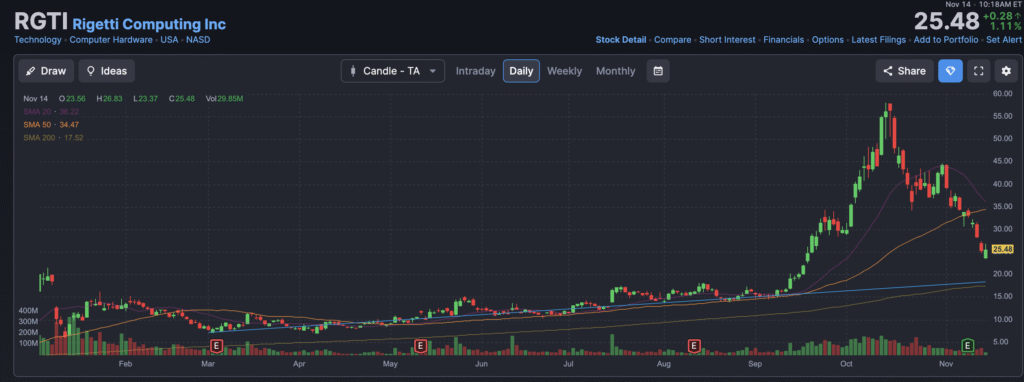Company Overview
Rigetti Computing is a U.S.–based full-stack quantum computing company that designs superconducting quantum processors (QPUs), fabricates them in its labs, and integrates them into a cloud-accessible quantum computing service. Founded in 2013, the company aims to enable organizations to run quantum algorithms that classical computers cannot handle. While largely pre-commercial, it positions itself to serve high-end use cases in optimization, simulation, and quantum-classical hybrid computing.

Recent Earnings (Q3 2025)
For the quarter ended September 30, 2025, Rigetti reported revenue of $1.947 million and a gross profit of $404 thousand. EPS came in at –$0.03, beating the consensus estimate of –$0.04. However, revenue fell short of expectations (e.g., a forecast around $2.17 million was cited) and operating losses remain large. The company provided limited forward guidance; given the early-stage nature of the business, expectations remain cautious.
Founding, Founders, Funding, Products, & Headquarters
Founded in 2013 by physicist Chad Rigetti, the company started out in Berkeley, California. It later went public via a SPAC merger (closing March 2022) under the ticker RGTI. Early investments came from venture capital (e.g., Andreessen Horowitz) as the company built its “Fab-1” quantum chip fabrication facility. Products include superconducting qubit chips, cloud quantum access via its Quantum Cloud Services (QCS) platform, and software libraries based on the Quil instruction set. Headquarters: Berkeley, California, with fabrication/engineering operations in the San Francisco Bay area. Key competitors include other quantum-hardware firms such as IonQ, Inc. and D‑Wave Quantum Inc..
Market & Growth Outlook
Rigetti operates in the quantum computing market, specifically hardware, cloud access, and hybrid quantum-classical services. Analysts estimate the global quantum computing market could be worth hundreds of billions of dollars by 2030-2040, though meaningful revenue today is very small. The CAGR for quantum computing services is speculative but many studies suggest 20-40 %+ per year in the next decade, although scaling challenges remain. Given Rigetti’s tiny revenue base, even modest commercial traction can translate into large percentage growth—yet absolute numbers remain low.
Competitors
IonQ and D-Wave are the most visible peers. IonQ focuses on trapped-ion quantum processors and has broader partnerships and acquisitions. D-Wave specializes in quantum-annealing and hybrid classical-quantum systems. These competitors have varying technology and go-to-market strategies, and both have longer commercial histories in certain niches.
Unique Differentiation
Rigetti’s key differentiator is its “full-stack” approach: it fabricates its own superconducting qubit hardware, builds control electronics and software, and offers cloud access through its platform. This vertical integration is intended to enable tighter optimization of qubit fidelity, latency, and application performance. Additionally, Rigetti’s strategy of combining quantum and classical computation (hybrid) is central to its positioning for near-term customer value.
Management Team
- Subodh Kulkarni, CEO – Took the helm in December 2022 and leads strategy and operations.
- Jeffrey Bertelsen, CFO – Manages financial operations and public-market communications.
- [Third member omitted due to limited public detail]
Financial Performance Overview (Last 5 Years)
Over the past five years, Rigetti’s revenue has remained extremely modest, with recent quarterly revenue in the low-single-digit millions of dollars. For example, Q3 2025 revenue was ~$1.947 m. Losses, however, are large and persistent—net losses are tens to hundreds of millions annually as R&D, fabrication and operating costs dominate. The company’s revenue growth in percentage terms may appear high (given its small base) but in absolute dollars remains small. Its balance sheet shows meaningful cash and liquid investments sufficient to fund operations for now, but dilution risk remains given ongoing cash burn and the need for further capital raises. Given this background, revenue CAGR is positive but the company remains unprofitable; earnings CAGR is deeply negative (losses widening). One must also consider that quantum companies are still in the R&D phase, and commercialization is not yet mainstream. The balance sheet, while financed, reflects a startup-scale company with high risk and high potential.
Bull Case
- Large addressable market: quantum computing could disrupt multiple industries (pharma, materials, optimization, finance).
- Unique full-stack architecture: vertical integration could yield competitive advantage in quantum hardware/software.
- Early mover in cloud quantum access: ability to build customer relationships and capture early use-cases before competitors scale.
Bear Case
- Commercial traction remains minimal: tiny revenues vs. large R&D and capital needs.
- Technological risk: scaling qubits, reducing error rates and achieving fault tolerance remain major engineering challenges.
- Valuation risk and dilution: with high market expectations baked in, any misstep or delay could lead to sharp pullbacks.

The stock is in a bearish stage 4 markdown on all 3 timeframes and should test its support at $14 – $21 range. This is a very speculative stock to own and should head down further before it heads higher.